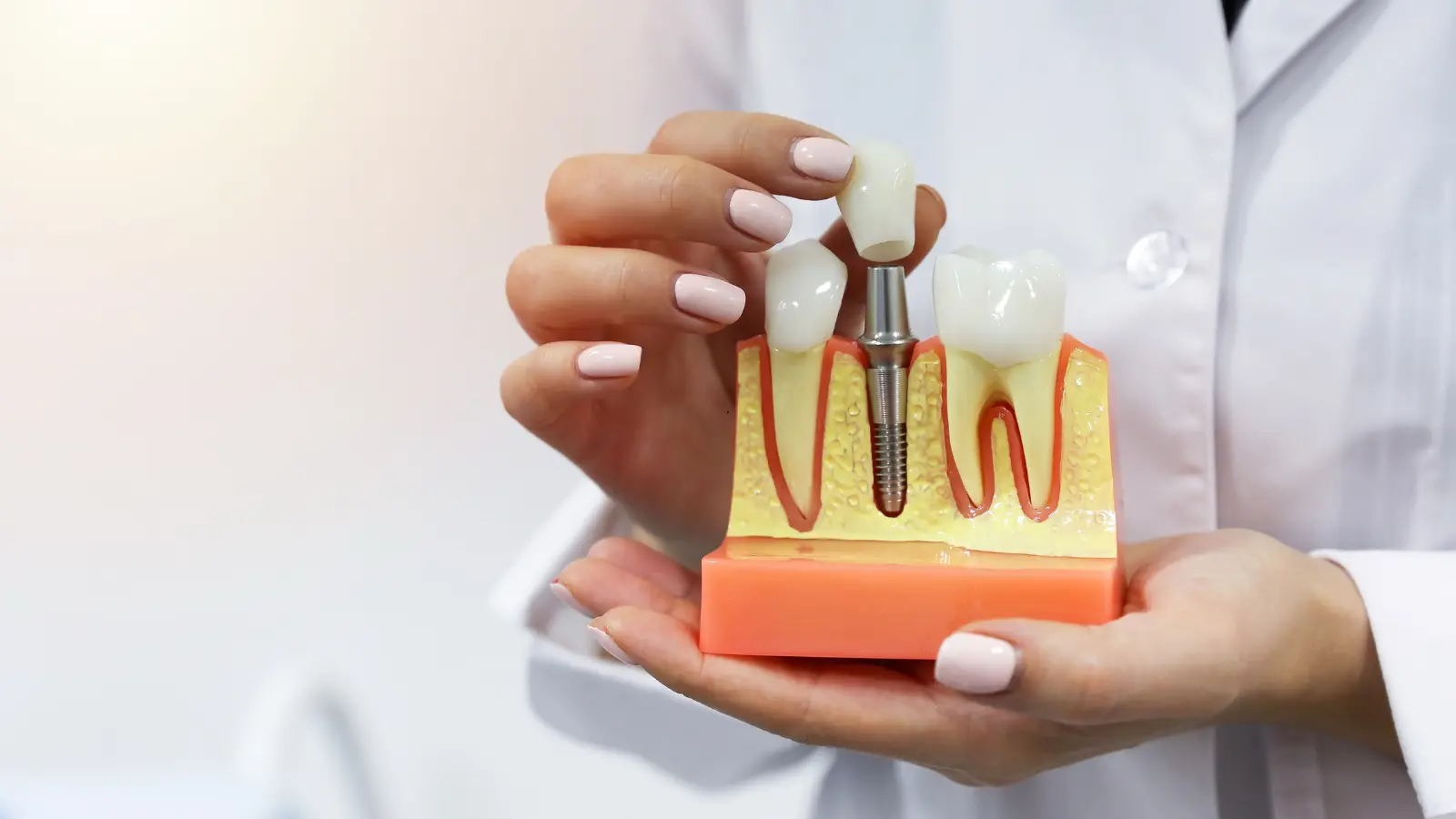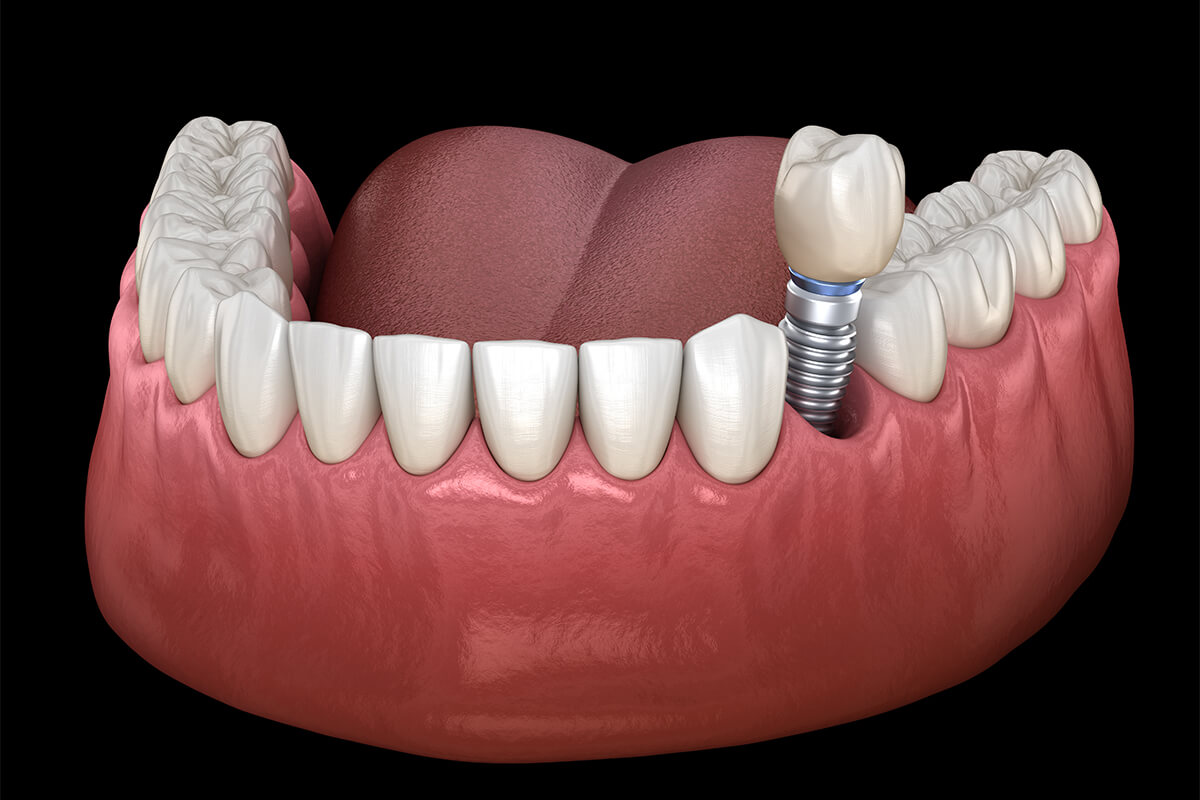Pay Online
Diabetes And Dental Implants: What You Need To Know

Dental implants are a popular and effective solution for replacing missing teeth, offering a permanent and natural-looking alternative to dentures or bridges. However, for individuals with diabetes, the decision to undergo dental implant surgery requires careful consideration and planning. Diabetes, particularly when poorly controlled, can impact the success of dental implants due to its effects on healing and infection risk.
This article will explore the relationship between diabetes and dental implants, providing valuable insights for those considering this procedure.
About Dental Implants
Dental implants are prosthetic tooth roots made of titanium posts that are surgically placed into the mandible. After the implant and bone have fused, a crown is placed. It creates a stable and durable replacement for a missing tooth.
Dental implants must properly heal and integrate with the jawbone for them to be successful, and these processes can be impacted by a number of variables, including general health.
The Impact of Diabetes on Dental Health
Diabetes affects the body’s ability to regulate blood sugar levels, leading to high blood sugar (hyperglycemia). This condition can have several implications for oral health:
- Delayed Healing: The body’s capacity to mend might be hampered by high blood sugar levels, making it more challenging for wounds to close and for tissues to regenerate after surgery, which is particularly concerning when it comes to diabetes and dental implants.
- Increased Infection Risk: Diabetes may impair immune function, making it more challenging to fend off infections. This is particularly concerning after surgery, where the risk of infection is already present.
- Gum Disease: Diabetes patients are more prone to gum disease, which can cause inflammation, bone loss, and other issues that may compromise the success of dental implants.
Diabetes and Dental Implant Success
The kind of diabetes, how well it is treated, and the recipient’s health are among the variables that determine whether dental implants are successful for diabetics. Here’s what you need to know:
- Diabetes Types 1 and 2: Each kind of disease can affect dental implant success. But the level of control over blood sugar levels is critical. Those with well-controlled diabetes may have similar success rates to non-diabetic patients, while poorly controlled diabetes increases the risk of complications.
- Pre-Surgery Evaluation: Before undergoing dental implant surgery, it’s vital to get a complete examination, which includes blood testing to assess blood sugar levels. Your oral surgeon or dentist must work closely with your physician to ensure your diabetes is well-managed before proceeding with the surgery.
- Bone Health: Diabetes can lead to bone density loss, which may affect the jawbone’s ability to support dental implants. Before implanting, the jawbone may need to be strengthened using a bone transplant.
Manage Diabetes for Successful Dental Implants
For individuals with diabetes, proper management of the condition is crucial to ensure the success of dental implants. Here are some key steps to take:
- Maintain Appropriate Blood Sugar Control: It’s critical to maintain your blood sugar levels in the appropriate range to reduce the risk of complications. Work with your healthcare team to monitor and manage your diabetes effectively.
- Practice Excellent Oral Hygiene: Maintaining the health of your dental implants and avoiding gum disease depend heavily on practicing good oral hygiene. To lower the chance of illness, use an antimicrobial mouthwash, floss once a day, and brush twice a day.
- Frequent Dental Visits: Especially after getting dental implants, scheduled checkups with your dentist are important for assessing the condition of your gums and teeth. Your dentist is able to identify such problems early on and administer the required care.
- Healthy Living Options: Eating a balanced diet, getting frequent exercise, and avoiding smoking are all important for managing diabetes and promoting overall health. These lifestyle choices can also improve the success rate of dental implants.
Potential Complications and How to Address Them
Even with careful management, there are still potential complications associated with dental implants in diabetic patients. Being aware of these risks and knowing how to address them is crucial:
- Infection: Post-surgery infections are a concern for diabetic patients. If you notice signs of infection, such as increased pain, swelling, or pus, contact your dentist immediately. Prompt treatment with antibiotics may be necessary.
- Implant Failure: Despite the great success rate of dental implants, there remains a chance of failure. Particularly in patients with poorly controlled diabetes. If an implant fails to integrate with the bone or becomes loose, it may need to be removed. It needs to be replaced after addressing the underlying issues.
- Slow Healing: Delayed healing is a common issue for diabetic patients. To promote faster healing, observe the post-surgery care recommendations provided by your dentist, which include practicing proper dental hygiene, taking prescribed medications, and attending follow-up appointments.
Dental implants can be a good option for people with diabetes. However, they need careful thought and management. To increase the chances of success, people with diabetes should keep their blood sugar under control, practice good dental hygiene, and work closely with their doctors.
However, it’s essential to be aware of the possible dangers and difficulties and to look into other choices if needed. If you’re diabetic and thinking about getting dental implants, consult your dentist to find out the best course of action.
With the right approach, you can achieve a healthy, confident smile while minimizing the risks associated with diabetes and dental implants.
Frequently Asked Questions
1. Can I get dental implants if I have diabetes?
Absolutely, dental implants are possible even if you have diabetes, but it’s crucial that your blood sugar levels are well-controlled. Uncontrolled diabetes may make problems more likely, such as infection and slow healing, which can affect the success of dental implants.
It’s important to consult with both your dentist and physician. Ensure that your diabetes is well-managed before proceeding with the procedure.
2. How does diabetes affect the success rate of dental implants?
Diabetes can affect dental implants. It can delay healing, increase infection risk, and impact how the implant integrates with the jawbone. But with good blood sugar control and oral care, many diabetic people have successful implants like those without diabetes.
3. What precautions should I take before getting dental implants if I have diabetes?
Before getting dental implants, ensure that your diabetes is well-controlled. You should have a thorough evaluation, including blood tests, to check your blood sugar levels. Maintaining good oral hygiene, avoiding smoking, and following a healthy lifestyle are also important steps to take before the surgery.





